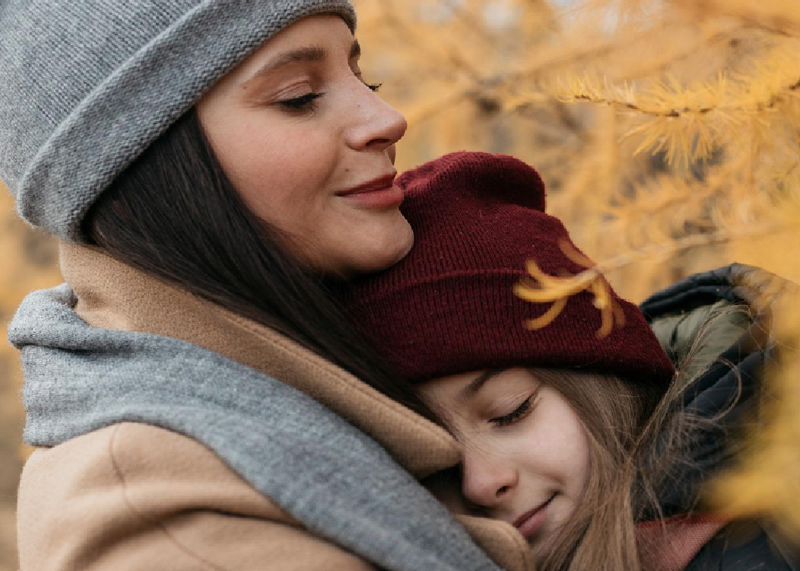

When we consciously welcome our children and teens to express themselves without judgment until they naturally find their way back to peace, we are holding space. This is something we all need reminding of. This takes being intentional and takes a lot of practice, especially when our child is having big emotions. The most important thing you can do to build more connection with your child is to stay regulated and hold space for them.
Our children unload on us when they feel safe to do so. For many of us, during our child’s storm, we’re quick to take things personally because either this only happens with us and not with anyone else in the family or we just want it to stop and are not sure what to do. I invite you to take a different perspective on this. If your child is storming with you often, it is because of the connection that you’ve created with them. Don’t take it personally! When they are having big emotions, it is because of the buildup of the cortisol in their body, their emotional cup is full and it’s time to be emptied. Your child or teen most likely spends a huge amount of time responding to the outside world by interacting with teachers, adults, coaches, peers and close family members and they feel like they have to hold it together all of the time. But where is their safe space? You parents are the most special big people in their lives and although it sometimes doesn’t feel good when they unload onto you, they need you. Don’t tell yourself my child is disrespectful to me because he gives me a hard time when I ask him to do X,Y, Z and he doesn’t give anyone else a hard time about it. Don’t take it personally! Reframe it as a compliment that you have created a safe place for your kid.
I recognize that sometimes it’s hard to be that safe place, but the work is worth it! To be clear, I am not encouraging you to become permissive or become a punching bag where your child hits or uses bad language etc. Setting limits for your child/teen helps them feel safe and loved. Here are some tools to help you deal with your child’s big emotions:
1. Hold Space & Work on Staying Regulated
When your child is melting down because they have received a signal that it is safe to do so, they can use the time with you to work the cortisol out of their body and unload their emotional cup. You have allowed them to be sensitive, uncomfortable, angry, emotional, frustrated and not hide their feelings. That is what holding space is. If you feel overwhelmed during these moments, sometimes that might mean that you need a break. Hit pause! “Hold on buddy, I need to use the bathroom, I’ll be right back”. This allows you a moment to gather your thoughts and feelings and create a game plan. Remember, unconditional parental love means your kids can rest in the assurance that you love them no matter what. This is the greatest tool we have in staying regulated. Motion changes emotion. Sometimes all we need is a minute to step away, take a moment to take a breath to regulate. I know I get dysregulated when I get surprised. When there’s a ton of information coming at me and I need time to process. I often get dysregulated when things are sprung on me. I often need to take a break. I teach all my clients to work through this by asking for a bathroom break. It’s always acceptable to excuse yourself to go to the bathroom. It signals to the other person I’m going to go and come right back. Hold on one minute. Hold please….Anything you can do to hit pause to get away for a second, move your body across the room, grab a drink of water, wash your hands, go to the bathroom, grab yourself a minute to get in motion so you can change your emotion so you can get regulated, and then you can hold space
for your child.
2. Don’t Take it Personally
When we are taking that moment to self-regulate. We need to remind ourselves not to take the storming personally. You have to stay regulated. If you’re not regulated, you can’t hold space. Holding space is compassionate listening, and it requires you to be regulated. When you’re compassionately listening, you’re listening with the intention to relieve the other person’s suffering. You’re not listening to correct or tell them where they’re wrong. Remember, your child’s big emotions are their best attempt at getting their needs met with the tools they have developed so far, so don’t take it personal if they are doing this and it’s messy. Once you are regulated, your child/teen will actually borrow from your calm. They will mirror your actions and reactions and begin to co-regulate their emotions.
Your child can rest assured that you love them no matter what. Whether they are arguing with their siblings, banging the backseat of the car, getting good grades or not, whether they are regulated or dysregulated. It is important to show your child that you love them the exact same no matter which side they show you. Sometimes what’s going on when our kids are having a tough time, what they really want to know is that we can hold space for them while they go through the storm. We’re not trying to get rid of the storm. We’re not trying to rush through it. We’re just holding space while they work through it. Again, unconditional parental love.
Many of us know that we want to parent our children differently than the way we were parented, yet we continue the cycle of yelling, punishments & threats.
Change is possible when you learn new ways of processing emotions and communicating effectively.

“This tool helped me feel more connected with my children, we work together as a team. My feelings of overwhelm are diminishing.” – Caitlin (mom of 4)